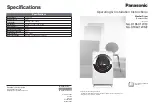
GB
19
Sorting your laundry
●
Check symbols on clothing labels to make sure
that the articles can be tumble dried.
●
Sort laundry by fabric type.
●
Empty pockets and check buttons.
●
Close zippers and hooks and tie loose belts and
strings.
●
Wring out each item in order to eliminate as much
excess water as possible.
!
Do not load dripping wet clothes into the dryer.
Maximum load size
Do not load more than maximum capacity.
These numbers refer to dry weight:
Natural fibres: 7kg max (15lb)
Synthetic fibres: 3kg max (6.6lb)
!
DO NOT overload the dryer as this could result in
reduced drying performance.
Typical weights
Note:
1kg = 1000g
(1lb = 16oz)
Clothes
Blouse
Cotton
150g
(5oz)
Other
100g
(3oz)
Dress
Cotton
500g
(1lb 2oz)
Other
350g
(12oz)
Jeans
700g
(1lb 6oz)
10 nappies
1000g
(2lb 3oz)
Shirt
Cotton
300g
(10oz)
Other
200g
(7oz)
T-Shirt
125g
(4oz)
Household Items
Duvet cover
Cotton
1500g
(3lb 5oz)
(Double)
Other
1000g
(2lb 3oz)
Large Tablecloth
700g
(1lb 6oz)
Small Tablecloth
250g
(9oz)
Tea Towel
100g
(3oz)
Bath Towel
700g
(1lb 6oz)
Hand Towel
350g
(12oz)
Double Sheet
500g
(1lb 2oz)
Single Sheet
350g
(12oz)
At the end of a drying cycle, cottons could still be
damp if you grouped cottons and synthetics together.
If this happens simply give them an additional short
period of drying.
●
Note:
The last 10 minutes of any time set is the
Cool Tumble, so allow for this when setting the time,
as this period will not dry your laundry.
Wash Care Labels
Look at the labels on your garments, especially when
tumble drying for the first time. The following symbols
are the most common:
May be tumble dried
Do
not
tumble dry
Tumble dry at high heat setting
Tumble dry at low heat setting
Items not suitable for tumble drying
●
Articles that containing rubber or rubber-like
materials or plastic film (pillows, cushions, or PVC
rainwear), any other flammable articles or objects
that contain flammable substances (towels soiled
with hair spray).
●
Glass fibres (certain types of draperies)
●
Items which have been dry cleaned
●
Items with the ITCL Code (
see Special
clothing items
). These can be cleaned with special
at-home dry cleaning products. Follow instructions
carefully.
●
Large bulky items (quilts, sleeping bags, pillows,
cushions, large bedspreads etc). These expand
when drying and would prevent airflow through
the dryer.
Laundry






































